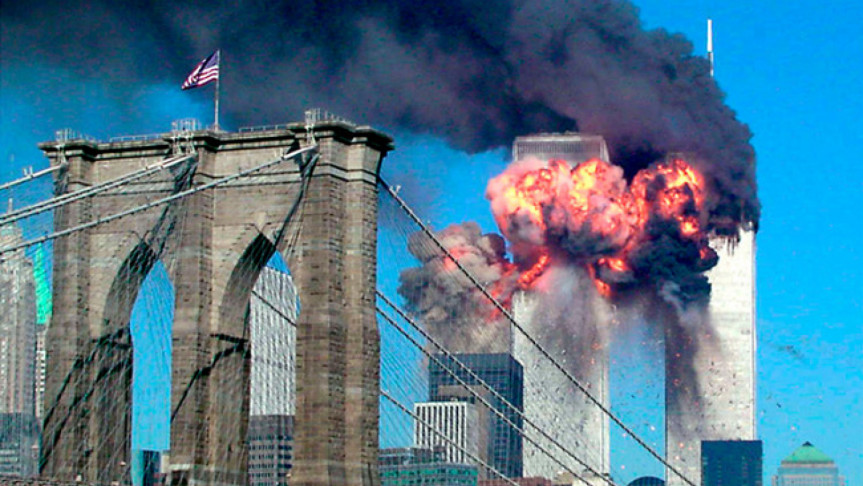People are still dying from the 9/11 attacks 17 years later

The flood of people coming down with illnesses stemming from the toxic dust kicked up by the 9/11 terror attacks has been so great that the US$7.3 billion ($NZ11.18b) dedicated to sufferers could run out before everyone has been helped, the Daily News has learned.
The 9/11 Victims Compensation Fund (VCF), which is responsible for providing financial assistance to those suffering from illnesses caused by Ground Zero contaminants, is already showing signs of strain, reports stuff.co.nz.
‘We do periodic assessments of our data,’ VCF Special Master Rupa Bhattacharyya told the Daily News. The assessments, she said, create projections that will determine if the fund will be able to help everyone before it expires on December 18, 2020.
‘Looking at the data more recently, I’m starting to get a little concerned,’ she said.
Bhattacharyya wouldn’t say if the fund is running out of money. She said the VCF plans to publish its updated projections in the next few weeks ‘and maybe seek some public comment on changes that will have to be made regarding our policies and procedures.’
Survivor advocates are concerned that, as the money peters out, those who file for compensation from now until the end will get less money than those who filed earlier with the same problems.
‘I’m pretty confident that they will run out of money,’ said 9/11 advocate John Feal. ‘But I don’t think people should be concerned right now. I bet my one kidney that we will get the VCF extended.’
Sources with knowledge of the VCF’s money woes said that a bill to extend the fund could be brought to Congress as early as next month.
Through August 31, the VCF has reviewed 38,502 compensation claims from 9/11 illness sufferers this year - a nearly 28 per cent jump over the 30,081 claims it took in last year over the same period. Of the 38,502, about 20,000 claims already have been approved with payouts that can range up to US$200,000 NZ$306,000), depending on the illness.
The VCF has also seen a 94 per cent jump in ‘deceased claims’ - requests for compensation by estates or family members of a 9/11 survivor who has already succumbed to illness. As of the end of August, 720 families have sought some form of financial compensation this year. In 2017, about 371 families did so in the same time frame.
And these numbers could continue to rise in the next few years, Bhattacharyya said.
‘There are diseases with long latency periods,’ she said. ‘Mesothelioma is one that is talked about often, and you won’t even see it for 15 or 20 years. We won’t see those claims for a while.’
According to the website Asbestos.com, an estimated 400 tonnes of asbestos - the microscopic fibers that cause mesothelioma - was used in the construction of the World Trade Centre. All of it was released into the air when the buildings were pulverised into dust.
A source with knowledge of the assessment procedure said the VCF still has more than US$3b in funding left to distribute, so any concerns Bhattacharyya might have are not imminent.
‘We’re required by statute to periodically reassess our policies and procedures to make sure we are prioritising the claimants with the most debilitating conditions,’ the source said. ‘Her concerns are part of the periodic reassessment process that was built into the statute. It’s part of what the statute requires VCF to do.’
Scores of the people inhaled the dust as they sifted through the powder-caked debris looking for survivors and remains, in what is considered one of the worst environmental disasters in the United States.
‘It was unprecedented in the US,’ said Dr John Howard, administrator for the World Trade Centre Health . ‘The acute number of fatalities on that day has not been surpassed, and the chronic health effects have people succumb to illnesses ... it seems incomparable that any other disaster is close.
‘We don’t want to see another one like this,’ he said.
As of June, 88,484 first responders and survivors have registered with the World Trade Centre Health Program.
Of that number, roughly 10,000 have some form of cancer that has been certified by the program.
‘[That’s] 10,000 people that were either first responders or were in the trade union, or victims, survivors or volunteers,’ former Daily Show host and 9/11-survivor advocate John Stewart told the Daily News. ‘I mean, this is an outrageous number.’
Howard said the health program has seen a ‘growth spurt’ within the last year - including a 260 per cent increase in those who either worked or lived at or around the site, who the program categories as ‘survivors.’
So many survivors have been coming through the door that the program has opened a new clinic on Franklin St in Lower Manhattan that will see an estimated 750 patients a month.
According to the best estimates, 90,000 first responders showed up at the World Trade Centre in the aftermath of the attack. An additional 400,000 survivors lived and worked in the area at the time.
Of that number, about 55,000 first responders and fewer than 20,000 survivors have registered with the World Trade Centre Health Program - meaning thousands more could be signing up in the next few years.
‘The numbers are real,’ said Feal. ‘This is not getting better. It’s getting worse.’
Feal estimates that someone dies of a 9/11-related illness an average of every 2.7 days. Neither the VCF nor the World Trade Centre Health Program keeps records on how many people have died of a 9/11-related illness, but Feal says the number is close to 2100. By the 20th anniversary of 9/11, more people will have died of an illness stemming from Ground Zero than the 2700 who died at the Twin Towers that day.
‘More people will have cancer,’ he said. ‘More people will have died, and that pains me.’

 NTV Online
NTV Online




